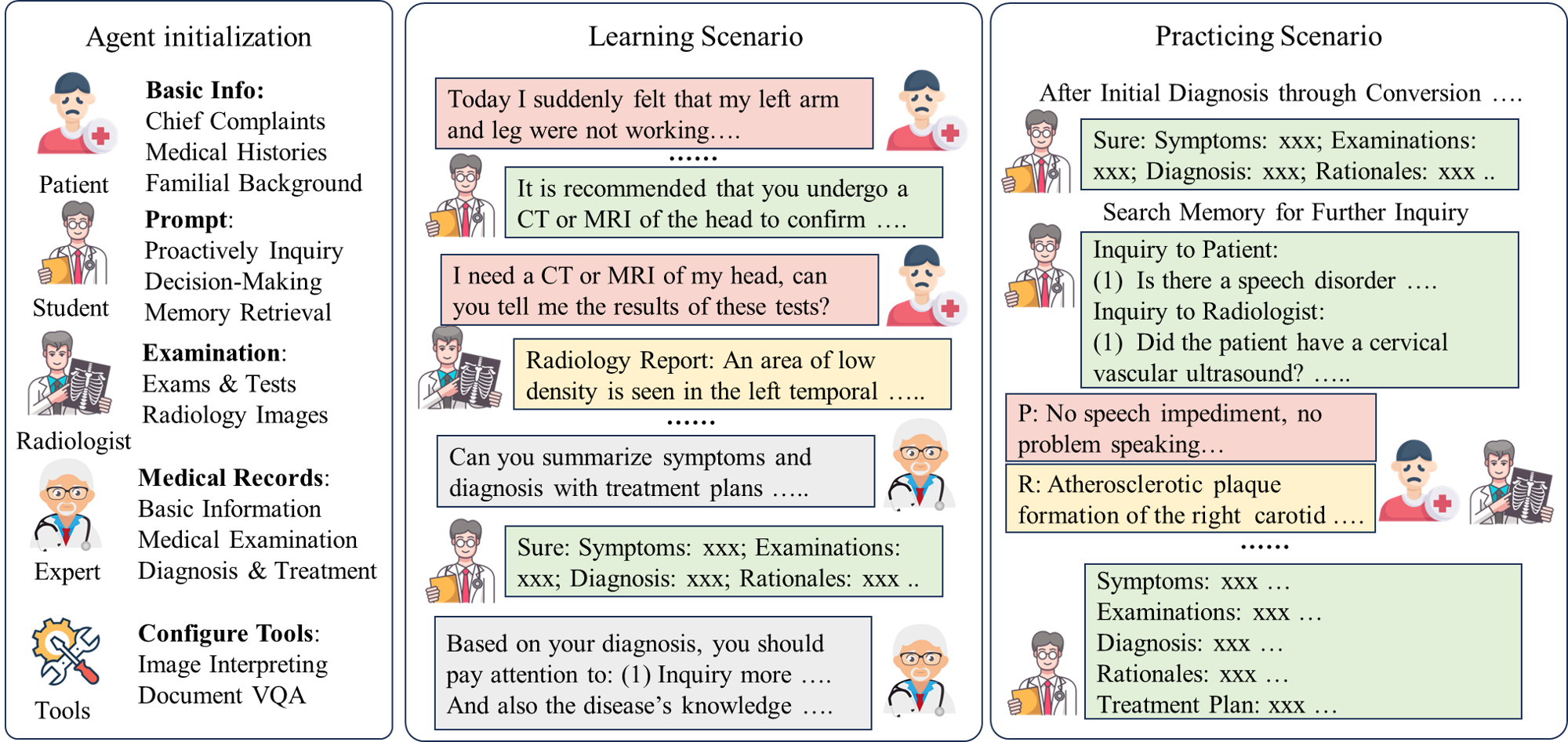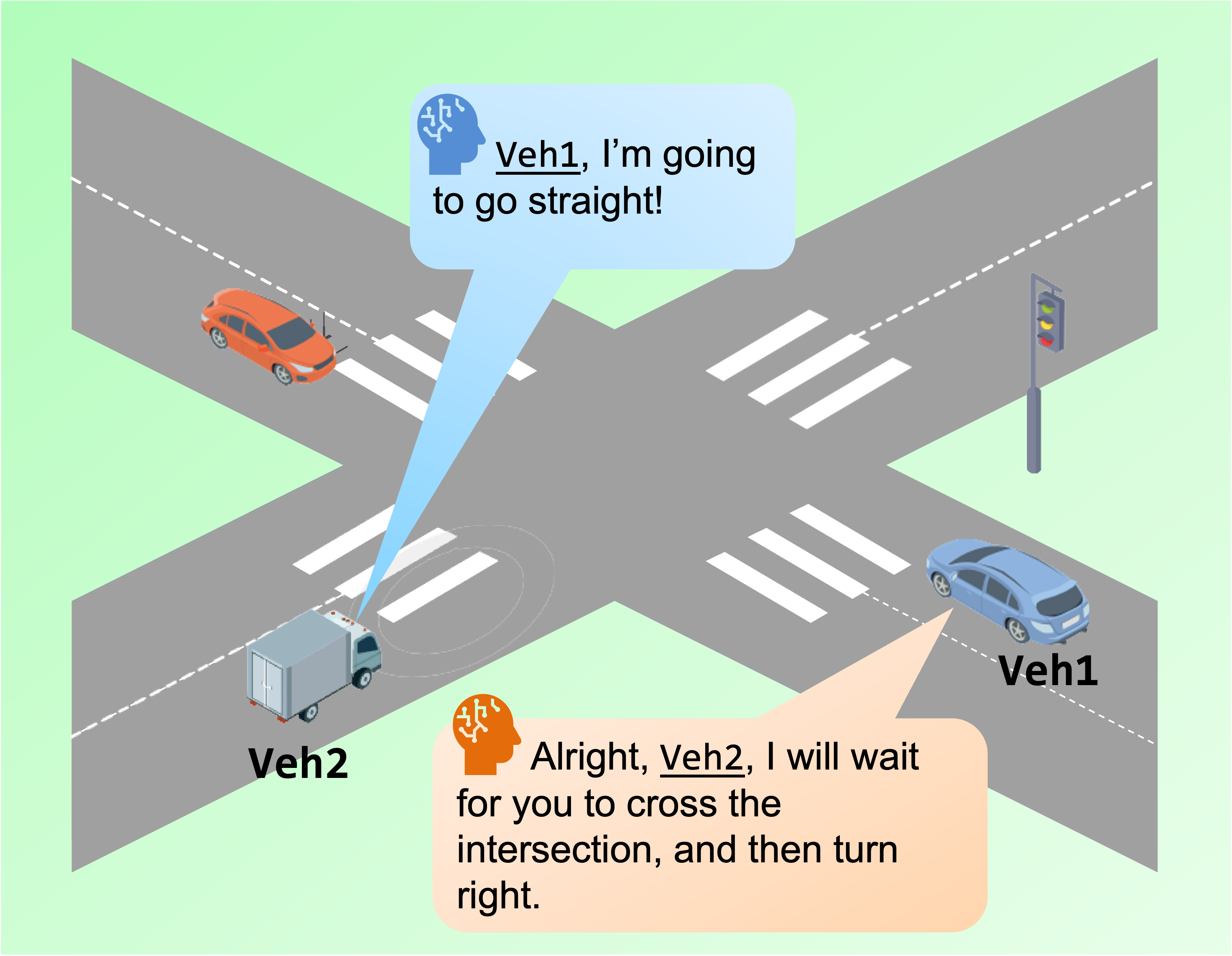MEDCO: Medical Education Copilots Based on A Multi-Agent Framework

0

Sign in to get full access
Overview
- This paper proposes a multi-agent framework called MEDCO (Medical Education Copilots) that leverages large language models (LLMs) to create intelligent agents for medical education.
- The agents are designed to collaborate with human learners, providing personalized guidance, answering questions, and helping to integrate new knowledge.
- The framework incorporates continual and agentic learning approaches to enable the agents to continuously adapt and improve over time.
Plain English Explanation
The researchers have developed a system called MEDCO that uses advanced AI [artificial intelligence] models to create virtual "co-pilots" for medical education. These AI agents are designed to work alongside human learners, providing personalized support and guidance.
The key idea is to harness the power of large language models - the same technology behind chatbots and digital assistants - and apply it to the medical education domain. The agents can engage in natural conversation, answer questions, and help students make connections between new information and what they already know.
Importantly, the agents are built with the ability to [<a href="https://aimodels.fyi/papers/arxiv/medagents-large-language-models-as-collaborators-zero">continuously learn and adapt</a>] over time. They don't just regurgitate pre-programmed knowledge, but can dynamically update their understanding based on interactions with students. This allows them to become increasingly helpful and tailored to each individual's needs.
The researchers believe this multi-agent framework can revolutionize medical education by providing personalized, responsive support that supplements traditional teaching methods. [<a href="https://aimodels.fyi/papers/arxiv/agentscodriver-large-language-model-empowered-collaborative-driving">Intelligent AI co-pilots</a>] could help students navigate the vast amount of information in medical curricula, reinforcing key concepts and guiding them toward mastery.
Technical Explanation
The MEDCO framework is built on a multi-agent architecture, with each agent representing a distinct capability or role. For example, there may be agents specialized in providing [<a href="https://aimodels.fyi/papers/arxiv/autonomous-artificial-intelligence-agents-clinical-decision-making">medical decision-making guidance</a>], answering questions, or tracking a student's progress and knowledge gaps.
These agents leverage large language models (LLMs) as their core knowledge base and reasoning engine. The LLMs are trained on vast troves of medical literature, allowing the agents to engage in fluent, contextual dialog and draw upon a deep understanding of medical concepts.
The framework also incorporates [<a href="https://aimodels.fyi/papers/arxiv/inquire-interact-integrate-proactive-agent-collaborative-framework">continual learning</a>] and [<a href="https://aimodels.fyi/papers/arxiv/benchmarking-large-language-models-communicative-medical-coaching">agentic learning</a>] approaches. This enables the agents to continuously update their knowledge and skills based on interactions with students, improving their ability to provide personalized support over time.
The researchers conducted experiments to evaluate the MEDCO framework, assessing factors like the agents' ability to answer questions, provide accurate guidance, and positively impact student learning outcomes. The results suggest this multi-agent approach can be an effective complement to traditional medical education methods.
Critical Analysis
The MEDCO framework represents an intriguing step forward in the application of large language models to educational domains. By embedding these powerful AI models within a multi-agent architecture, the researchers have created a system that can provide personalized, responsive support to learners.
However, the paper acknowledges several key limitations and areas for further research. For example, the current implementation focuses on factual knowledge and problem-solving, but does not yet address the nuanced communication and empathy skills that are crucial for effective patient-provider interactions.
Additionally, the researchers note the need to further investigate issues of bias, transparency, and accountability within the MEDCO system. As these AI agents become more deeply integrated into medical education, it will be critical to ensure they are behaving ethically and that their decision-making processes are well understood.
Overall, the MEDCO framework demonstrates the potential for AI to revolutionize medical education, but also highlights the importance of thoughtful design and rigorous testing to realize this potential while mitigating potential risks.
Conclusion
The MEDCO framework represents a novel approach to leveraging large language models and multi-agent systems to create intelligent, adaptive "co-pilots" for medical education. By providing personalized guidance, answering questions, and helping students integrate new knowledge, these AI agents have the potential to significantly enhance traditional teaching methods.
While further research is needed to address limitations and ensure ethical deployment, the core ideas behind MEDCO point to an exciting future where AI technology can be seamlessly integrated into the educational process. As medical curricula continue to grow in complexity, intelligent assistants like those described in this paper may become invaluable tools for helping the next generation of healthcare providers thrive.
This summary was produced with help from an AI and may contain inaccuracies - check out the links to read the original source documents!
Related Papers


0
MEDCO: Medical Education Copilots Based on A Multi-Agent Framework
Hao Wei, Jianing Qiu, Haibao Yu, Wu Yuan
Large language models (LLMs) have had a significant impact on diverse research domains, including medicine and healthcare. However, the potential of LLMs as copilots in medical education remains underexplored. Current AI-assisted educational tools are limited by their solitary learning approach and inability to simulate the multi-disciplinary and interactive nature of actual medical training. To address these limitations, we propose MEDCO (Medical EDucation COpilots), a novel multi-agent-based copilot system specially developed to emulate real-world medical training environments. MEDCO incorporates three primary agents: an agentic patient, an expert doctor, and a radiologist, facilitating a multi-modal and interactive learning environment. Our framework emphasizes the learning of proficient question-asking skills, multi-disciplinary collaboration, and peer discussions between students. Our experiments show that simulated virtual students who underwent training with MEDCO not only achieved substantial performance enhancements comparable to those of advanced models, but also demonstrated human-like learning behaviors and improvements, coupled with an increase in the number of learning samples. This work contributes to medical education by introducing a copilot that implements an interactive and collaborative learning approach. It also provides valuable insights into the effectiveness of AI-integrated training paradigms.
Read more8/23/2024
💬

0
MedAgents: Large Language Models as Collaborators for Zero-shot Medical Reasoning
Xiangru Tang, Anni Zou, Zhuosheng Zhang, Ziming Li, Yilun Zhao, Xingyao Zhang, Arman Cohan, Mark Gerstein
Large language models (LLMs), despite their remarkable progress across various general domains, encounter significant barriers in medicine and healthcare. This field faces unique challenges such as domain-specific terminologies and reasoning over specialized knowledge. To address these issues, we propose MedAgents, a novel multi-disciplinary collaboration framework for the medical domain. MedAgents leverages LLM-based agents in a role-playing setting that participate in a collaborative multi-round discussion, thereby enhancing LLM proficiency and reasoning capabilities. This training-free framework encompasses five critical steps: gathering domain experts, proposing individual analyses, summarising these analyses into a report, iterating over discussions until a consensus is reached, and ultimately making a decision. Our work focuses on the zero-shot setting, which is applicable in real-world scenarios. Experimental results on nine datasets (MedQA, MedMCQA, PubMedQA, and six subtasks from MMLU) establish that our proposed MedAgents framework excels at mining and harnessing the medical expertise within LLMs, as well as extending its reasoning abilities. Our code can be found at https://github.com/gersteinlab/MedAgents.
Read more6/6/2024


0
AgentsCoDriver: Large Language Model Empowered Collaborative Driving with Lifelong Learning
Senkang Hu, Zhengru Fang, Zihan Fang, Yiqin Deng, Xianhao Chen, Yuguang Fang
Connected and autonomous driving is developing rapidly in recent years. However, current autonomous driving systems, which are primarily based on data-driven approaches, exhibit deficiencies in interpretability, generalization, and continuing learning capabilities. In addition, the single-vehicle autonomous driving systems lack of the ability of collaboration and negotiation with other vehicles, which is crucial for the safety and efficiency of autonomous driving systems. In order to address these issues, we leverage large language models (LLMs) to develop a novel framework, AgentsCoDriver, to enable multiple vehicles to conduct collaborative driving. AgentsCoDriver consists of five modules: observation module, reasoning engine, cognitive memory module, reinforcement reflection module, and communication module. It can accumulate knowledge, lessons, and experiences over time by continuously interacting with the environment, thereby making itself capable of lifelong learning. In addition, by leveraging the communication module, different agents can exchange information and realize negotiation and collaboration in complex traffic environments. Extensive experiments are conducted and show the superiority of AgentsCoDriver.
Read more4/23/2024
💬

0
Benchmarking Large Language Models on Communicative Medical Coaching: a Novel System and Dataset
Hengguan Huang, Songtao Wang, Hongfu Liu, Hao Wang, Ye Wang
Traditional applications of natural language processing (NLP) in healthcare have predominantly focused on patient-centered services, enhancing patient interactions and care delivery, such as through medical dialogue systems. However, the potential of NLP to benefit inexperienced doctors, particularly in areas such as communicative medical coaching, remains largely unexplored. We introduce ChatCoach, a human-AI cooperative framework designed to assist medical learners in practicing their communication skills during patient consultations. ChatCoach (Our data and code are available online: https://github.com/zerowst/Chatcoach)differentiates itself from conventional dialogue systems by offering a simulated environment where medical learners can practice dialogues with a patient agent, while a coach agent provides immediate, structured feedback. This is facilitated by our proposed Generalized Chain-of-Thought (GCoT) approach, which fosters the generation of structured feedback and enhances the utilization of external knowledge sources. Additionally, we have developed a dataset specifically for evaluating Large Language Models (LLMs) within the ChatCoach framework on communicative medical coaching tasks. Our empirical results validate the effectiveness of ChatCoach.
Read more6/11/2024